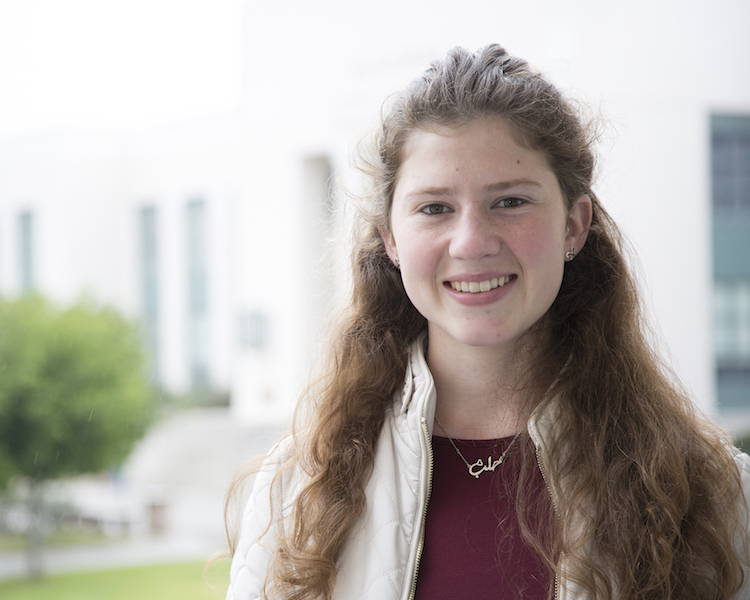
Haya Kaliounji is 19 years old. A motivated PCC student, she is taking two classes this Winter Intersession, a heavy lift in the shortened six-week term. She hopes to follow in her brother’s footsteps and attend UCLA to study biology. She’s an accomplished Girl Scout.
An Arabic word is written on the necklace she always wears near her heart. It translates as “Halab,” the name of her hometown – Aleppo, Syria.
Haya is one of thousands of Syrians who came to the United States to escape the civil war that erupted there 6 years ago. She arrived in Los Angeles at the age of 15 in 2013 when her mother acquired a visa to work at an engineering firm. The visa allowed her father and siblings to come live in the U.S., and the family left the country by way of Lebanon as the war was breaking out in their home country.
“When I first came, it was easier than I expected,” Haya said. “There was a bit of a culture shock, but it wasn’t too hard to adapt.” While her parents had friends in their new community, Haya didn’t know many other Syrians when she first arrived. A schoolmate from Lebanon Syria lived in Glendale, but otherwise she was on her own. She immersed herself in her new life.
As time went on, the news from Syria got worse and worse. Her father had owned a poultry farm and some agricultural land, and he also ran a print shop in the city. During the time that the family has been in America, he has continued to travel back and forth to take care of what’s left of his business. At its worst, the violence hit the family directly: The Islamic State slaughtered his 180,000 chickens and took over the farm. When the city was under siege, the family had to operate the print shop out of a church.
As her father brought back worse and worse news from home, and as she watched with increasing horror the images of the violence affecting her city and her people, Haya felt an urge to help. “I wanted to do something for the Syrian community,” she said. “But it’s tricky, because they need big things that I can’t provide.”
She was planning her Gold Award for the Girl Scouts, and she started collecting money to help the children she saw in reports from home, some of whom had lost limbs in the violence. She decided to fund prosthetic devices for these youngest victims of the war.
Haya started telling her friends and neighbors about the injured Syrian children. She would speak after mass at her church, collecting donations as people left the services. She sold handmade craft projects to raise money. She eventually joined forces with a Syrian priest at a North Hollywood Arabic Christian church, which allowed her to formalize her charity and accept tax-deductible donations from corporations and other organizations. She has a GoFundMe page for her organization, Rise Again, and has raised nearly a third of her $3,000 goal. Since starting her Girl Scout project in June 2015, she has helped 10 Syrian children, some as young as three years old, replace limbs lost in the war.
The Trump Administration’s recent immigration order, and the uncertainty following it, has required her to rethink her plans. Since 2014, Haya, her mother, and her siblings gained temporary protected status and have been awaiting a ruling on their request for asylum, but her father needed a different kind of visa, one that would allow him to enter the U.S. on a regular basis. Since his visa will expire soon, her father has to go back to Syria, but once he gets there, he might not be able to enter the U.S for a long time.
If he returns to Aleppo, however, he faces an uncertain future. The government’s 90-day immigration freeze expires at the end of April, but there is no guarantee that travel from Syria will resume. Violence in the city has declined recently, and the citizens are beginning the arduous process of rebuilding, but the fighting could flare up again with little warning. If Haya’s father ends up in the middle of a war zone, Haya and her family will be unable to do anything to help.
Although the situation is dire, Haya radiates optimism about the future. She follows her Christian faith, trusting in humanity’s inherent ability to love and accept people of all backgrounds. She hasn’t yet joined the thousands of protesters marching against the Trump Administration’s immigration order, but the images on her news feeds made her feel good about her adopted country. “I’m happy to see that everyone is paying attention,” she said.
As she finishes up her studies and prepares to transfer to a four-year college, Haya is looking forward to continuing her American journey. Her heart remains in Aleppo, though. “In a few years I’ll have spent half of my life in the U.S.,” she said, “but I’ll always consider Syria home.”
PCC provides the ability to comment on our website as a means of promoting free expression of ideas. Posts that include profanity, hate speech, threats of violence, solicitations, or other similar content will be removed. The views expressed by commenters do not necessarily reflect the views of Pasadena City College.
03/01/2026